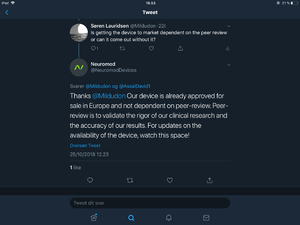It was first released a couple of years ago, but was pulled from market (I don't think it has been published why).Can someone give a summary? The device seems to have been released... so why is it not up for sale?
Now it's coming to market again, read these two posts for updates:
Those two posts should answer your other questions as well.
This was an idea that @JohnAdams had earlier, and it's not a bad one.As a community, why don't we pool our resources and purchase a few of these, and let Tinnitus Talk users try it out? We rotate the devices between the users. If it doesn't work for you, pass it along. If it does work, finish treatment, then pass it along. If you wanna keep it, buy it. I mean, FFS, why can't we work together in this? Collaborate.
We need to see how the device works. The previous version of the device required buying and having it set up to your unique tinnitus profile via an audiologist.

 Founder
Founder Member
Member
